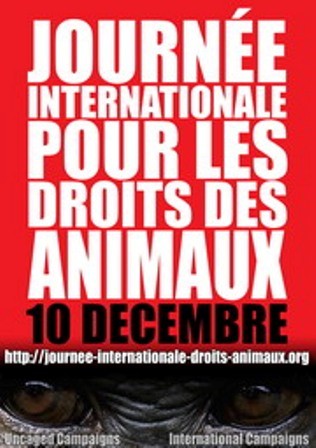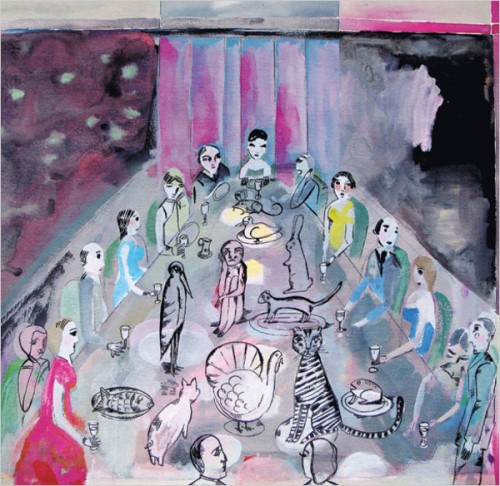Published: November 21, 2009
Lewisburg, Pa.
LATELY more people have begun to express an interest in where the meat they eat comes from and how it was raised.
Were the animals humanely treated?
Did they have a good quality of life before the death that turned them into someone’s dinner?
Some of these questions, which reach a fever pitch in the days leading up to Thanksgiving, pertain to the ways in which animals are treated. (Did your turkey get to live outdoors?)
Others focus on the question of how eating the animals in question will affect the consumer’s health and well-being. (Was it given hormones and antibiotics?)
None of these questions, however, make any consideration of whether it is wrong to kill animals for human consumption.
And even when people ask this question, they almost always find a variety of resourceful answers that purport to justify the killing and consumption of animals in the name of human welfare.
Strict ethical vegans, of which I am one, are customarily excoriated for equating our society’s treatment of animals with mass murder.
Can anyone seriously consider animal suffering even remotely comparable to human suffering?
Those who answer with a resounding no typically argue in one of two ways.
Some suggest that human beings but not animals are made in God’s image and hence stand in much closer proximity to the divine than any non-human animal; according to this line of thought, animals were made expressly for the sake of humans and may be used without scruple to satisfy their needs and desires.
There is ample support in the Bible and in the writings of Christian thinkers like Augustine and Thomas Aquinas for this pointedly anthropocentric way of devaluing animals.
Others argue that the human capacity for abstract thought makes us capable of suffering that both qualitatively and quantitatively exceeds the suffering of any non-human animal.
Philosophers like Jeremy Bentham, who is famous for having based moral status not on linguistic or rational capacities but rather on the capacity to suffer, argue that because animals are incapable of abstract thought, they are imprisoned in an eternal present, have no sense of the extended future and hence cannot be said to have an interest in continued existence.
The most penetrating and iconoclastic response to this sort of reasoning came from the writer Isaac Bashevis Singer in his story “The Letter Writer,” in which he called the slaughter of animals the “eternal Treblinka.”
The story depicts an encounter between a man and a mouse.
The man, Herman Gombiner, contemplates his place in the cosmic scheme of things and concludes that there is an essential connection between his own existence as “a child of God” and the “holy creature” scuffling about on the floor in front of him.
Surely, he reflects, the mouse has some capacity for thought; Gombiner even thinks that the mouse has the capacity to share love and gratitude with him.
Not merely a means for the satisfaction of human desires, nor a mere nuisance to be exterminated, this tiny creature possesses the same dignity that any conscious being possesses.
In the face of that inherent dignity, Gombiner concludes, the human practice of delivering animals to the table in the form of food is abhorrent and inexcusable.
Many of the people who denounce the ways in which we treat animals in the course of raising them for human consumption never stop to think about this profound contradiction.
Instead, they make impassioned calls for more “humanely” raised meat.
Many people soothe their consciences by purchasing only free-range fowl and eggs, blissfully ignorant that “free range” has very little if any practical significance.
Chickens may be labeled free-range even if they’ve never been outside or seen a speck of daylight in their entire lives. And that Thanksgiving turkey?
Even if it is raised “free range,” it still lives a life of pain and confinement that ends with the butcher’s knife.
How can intelligent people who purport to be deeply concerned with animal welfare and respectful of life turn a blind eye to such practices?
And how can people continue to eat meat when they become aware that nearly 53 billion land animals are slaughtered every year for human consumption?
The simple answer is that most people just don’t care about the lives or fortunes of animals.
If they did care, they would learn as much as possible about the ways in which our society systematically abuses animals, and they would make what is at once a very simple and a very difficult choice: to forswear the consumption of animal products of all kinds.
The easy part of this consists in seeing clearly what ethics requires and then just plain doing it.
The difficult part: You just haven’t lived until you’ve tried to function as a strict vegan in a meat-crazed society.
What were once the most straightforward activities become a constant ordeal.
You might think that it’s as simple as just removing meat, eggs and dairy products from your diet, but it goes a lot deeper than that.
To be a really strict vegan is to strive to avoid all animal products, and this includes materials like leather, silk and wool, as well as a panoply of cosmetics and medications.
The more you dig, the more you learn about products you would never stop to think might contain or involve animal products in their production — like wine and beer (isinglass, a kind of gelatin derived from fish bladders, is often used to “fine,” or purify, these beverages), refined sugar (bone char is sometimes used to bleach it) or Band-Aids (animal products in the adhesive). Just last week I was told that those little comfort strips on most razor blades contain animal fat.
To go down this road is to stare headlong into an abyss that, to paraphrase Nietzsche, will ultimately stare back at you.
The challenges faced by a vegan don’t end with the nuts and bolts of material existence.
You face quite a few social difficulties as well, perhaps the chief one being how one should feel about spending time with people who are not vegans.
Is it O.K. to eat dinner with people who are eating meat?
What do you say when a dining companion says, “I’m really a vegetarian — I don’t eat red meat at home.” (I’ve heard it lots of times, always without any prompting from me.)
What do you do when someone starts to grill you (so to speak) about your vegan ethics during dinner? (Wise vegans always defer until food isn’t around.)
Or when someone starts to lodge accusations to the effect that you consider yourself morally superior to others, or that it is ridiculous to worry so much about animals when there is so much human suffering in the world? (Smile politely and ask them to pass the seitan.)
Let me be candid: By and large, meat-eaters are a self-righteous bunch.
The number of vegans I know personally is ... five.
And I have been a vegan for almost 15 years, having been a vegetarian for almost 15 before that.
Five.
I have lost more friends than this over arguments about animal ethics.
One lapidary conclusion to be drawn here is that people take deadly seriously the prerogative to use animals as sources of satisfaction.
Not only for food, but as beasts of burden, as raw materials and as sources of captive entertainment — which is the way animals are used in zoos, circuses and the like.
These uses of animals are so institutionalized, so normalized, in our society that it is difficult to find the critical distance needed to see them as the horrors that they are: so many forms of subjection, servitude and — in the case of killing animals for human consumption and other purposes — outright murder.
People who are ethical vegans believe that differences in intelligence between human and non-human animals have no moral significance whatsoever.
The fact that my cat can’t appreciate Schubert’s late symphonies and can’t perform syllogistic logic does not mean that I am entitled to use him as an organic toy, as if I were somehow not only morally superior to him but virtually entitled to treat him as a commodity with minuscule market value.
We have been trained by a history of thinking of which we are scarcely aware to view non-human animals as resources we are entitled to employ in whatever ways we see fit in order to satisfy our needs and desires.
Yes, there are animal welfare laws.
But these laws have been formulated by, and are enforced by, people who proceed from the proposition that animals are fundamentally inferior to human beings.
At best, these laws make living conditions for animals marginally better than they would be otherwise — right up to the point when we send them to the slaughterhouse.
Think about that when you’re picking out your free-range turkey, which has absolutely nothing to be thankful for on Thanksgiving.
All it ever had was a short and miserable life, thanks to us intelligent, compassionate humans.
Gary Steiner, a professor of philosophy at Bucknell University, is the author of Animals and the Moral Community: Mental Life, Moral Status and Kinship.
http://www.nytimes.com/2009/11/22/opinion/22steiner.html?pagewanted=1&_r=1&partner=rss&emc=rss&adxnnlx=1258999957-AA67fq2m3kDPcsdzPn5QOw






